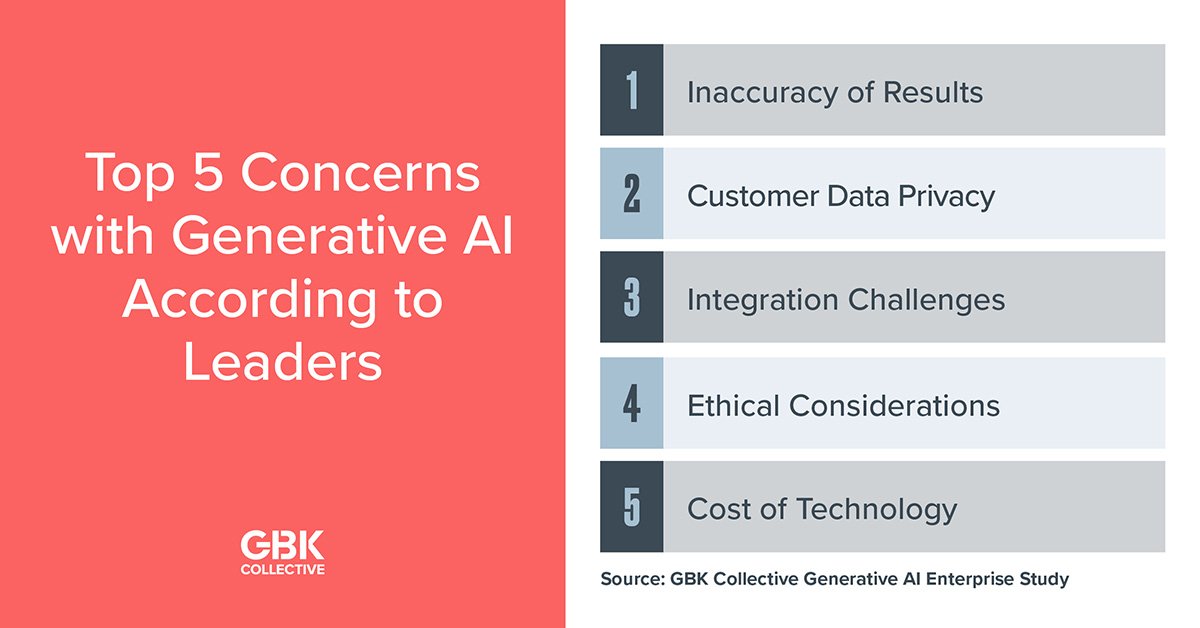Generative AI’s Impact on Customer Experience and Decision-making with Wharton's Stefano Puntoni
By GBK Collective
Wharton Professor Stefano Puntoni, Director of AI at Wharton, joined the Modern Customer podcast with Forbes columnist Blake Morgan today to discuss GBK’s recent study, The Rise of Generative AI in the Enterprise. Among the topics explored in the episode: how will generative AI impact customer experience and marketing, what adoption and usage trends are we seeing, and the importance of taking a strategic approach when applying gen AI and data to decision making.
Below are a few key takeaways from the episode along with insights from Stefano:
Generative AI adoption growing even faster than expected
GBK’s study, based on a survey with 672 senior leaders from U.S. enterprises, each with annual sales surpassing $50 million, revealed just how rapid adoption is for generative AI is across companies.
"Over half (58%) of the executives that we surveyed are already using generative AI," notes Prof. Puntoni who co-directed the study with GBK. “And this was really surprising to us. The technology has only been around in its most accessible format for about a year and we already see massive uptake. This is not a technology that is around the corner. It’s already here.”
THE RISE OF GENERATIVE AI ACROSS ENTERPRISES -> CLICK HERE TO GET THE FULL REPORT
Emerging use cases for generative AI
In his discussion with Blake, Stefano also shared his perspective on emerging applications for generative AI, highlighting its potential to personalize interactions, streamline processes, and boost customer satisfaction.
In our survey, top use cases shared by leaders included data analysis (89%), marketing content and creation (text, images, video) (87%), researching customer & competitive insights (84%), customer support (82%), and automated content generation and personalization (82%).
“The use case that had the highest level of endorsement was data analysis,” said Puntoni. “Another use case that was very well endorsed was marketing content. As you can imagine, a lot of work in marketing from designing websites and creating product-related materials or reports to writing content for social media or other channels can be done to a large extent by relying on generative AI."
“Many companies obsess over data.. but you are only going to get useful insight from data when analytics are serving important business decisions. The question is not what do I do with data? The right question to ask is what data is needed to make the decision we need to make?”
- Wharton Professor Stefano Puntoni
The impact of generative AI on customer experience
Stefano also discussed how generative AI can improve personalization while underscoring the importance of human oversight in building better customer experiences and making that the priority.
"Customer service and experiences will be impacted by generative AI in many ways... But I think more exciting area to think about is how to augment human skills and get employees even more involved in the process of engaging customers."
In addition to personalizing content, generative AI can help analyze consumers’ shopping habits, preferences and behaviors, helping companies to scale marketing and provide customized recommendations and offers.
Advancements with generative AI continue to accelerate with bots even capable in the future of outperforming human sales and customer representatives. In this context, the question for companies becomes are they applying technology in a way that’s strategic and actually adding value for customers.
As Puntoni notes, “The potential danger for companies to keep in mind as they deploy any new technology is will it undermine your customer relationships? What's your motivation for doing this? Are you actually motivated by customer affinity and understanding the customer? Or are you purely driven by saving a few bucks by deploying this?”
Data informed decisions vs. data driven
While optimism about generative AI is prevalent, concerns around accuracy, bias, and AI's role in decision-making remain, according to our study. As generative AI becomes increasingly ingrained across teams, Puntoni stressed the importance of data governance and firms taking a strategic approach.
“We see many companies that obsess over data,” said Puntoni. “They want to have data lakes and maybe even data oceans. But you are only going to get useful insight from data when analytics are serving important business decisions. The question is not what do I do with data? The right question to ask is what data is needed to make the decision we need to make?”
This is at the core of GBK’s ongoing work, seeking out data and insights to help clients solve specific problems and make better decisions that drive customer growth.
“Many companies have got it upside down,” continued Puntoni. “The goal isn't to be data-driven. Rather what we argue is that their data analytics should be decision-driven. What data is needed to solve the problems that we have?”
Looking for more insights on emerging trends with generative AI and how you can maximize impact for your business? Click here to get a copy of our full report.


